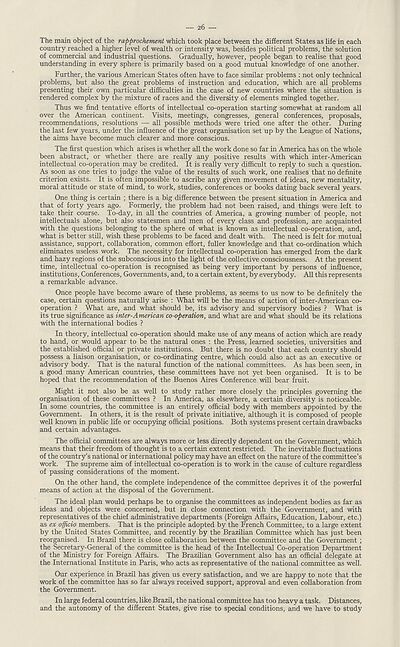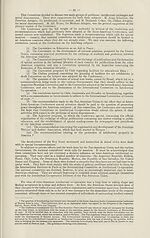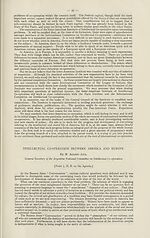International > Proceedings of the second General conference of national committees on intellectual co-operation, Paris, July 5th-9th, 1937
(28)
Download files
Complete book:
Individual page:
Thumbnail gallery: Grid view | List view

26 —
The main object of the rapprochement which took place between the different States as life in each
country reached a higher level of wealth or intensity was, besides political problems, the solution
of commercial and industrial questions. Gradually, however, people began to realise that good
understanding in every sphere is primarily based on a good mutual knowledge of one another.
Further, the various American States often have to face similar problems : not only technical
problems, but also the great problems of instruction and education, which are all problems
presenting their own particular difficulties in the case of new countries where the situation is
rendered complex by the mixture of races and the diversity of elements mingled together.
Thus we find tentative efforts of intellectual co-operation starting somewhat at random all
over the American continent. Visits, meetings, congresses, general conferences, proposals,
recommendations, resolutions — all possible methods were tried one after the other. During
the last few years, under the influence of the great organisation set up by the League of Nations,
the aims have become much clearer and more conscious.
The first question which arises is whether all the work done so far in America has on the whole
been abstract, or whether there are really any positive results with which inter-American
intellectual co-operation may be credited. It is really very difficult to reply to such a question.
As soon as one tries to judge the value of the results of such work, one realises that no definite
criterion exists. It is often impossible to ascribe any given movement of ideas, new mentality,
moral attitude or state of mind, to work, studies, conferences or books dating back several years.
One thing is certain ; there is a big difference between the present situation in America and
that of forty years ago. Formerly, the problem had not been raised, and things were left to
take their course. To-day, in all the countries of America, a growing number of people, not
intellectuals alone, but also statesmen and men of every class and profession, are acquainted
with the questions belonging to the sphere of what is known as intellectual co-operation, and,
what is better still, wish these problems to be faced and dealt with. The need is felt for mutual
assistance, support, collaboration, common effort, fuller knowledge and that co-ordination which
eliminates useless work. The necessity for intellectual co-operation has emerged from the dark
and hazy regions of the subconscious into the light of the collective consciousness. At the present
time, intellectual co-operation is recognised as being very important by persons of influence,
institutions, Conferences, Governments, and, to a certain extent, by everybody. All this represents
a remarkable advance.
Once people have become aware of these problems, as seems to us now to be definitely the
case, certain questions naturally arise : What will be the means of action of inter-American co¬
operation ? What are, and what should be, its advisory and supervisory bodies ? What is
its true significance as inter-American co-operation, and what are and what should be its relations
with the international bodies ?
In theory, intellectual co-operation should make use of any means of action which are ready
to hand, or would appear to be the natural ones : the Press, learned societies, universities and
the established official or private institutions. But there is no doubt that each country should
possess a liaison organisation, or co-ordinating centre, which could also act as an executive or
advisory body. That is the natural function of the national committees. As has been seen, in
a good many American countries, these committees have not yet been organised. It is to be
hoped that the recommendation of the Buenos Aires Conference will bear fruit.
Might it not also be as well to study rather more closely the principles governing the
organisation of these committees ? In America, as elsewhere, a certain diversity is noticeable.
In some countries, the committee is an entirely official body with members appointed by the
Government. In others, it is the result of private initiative, although it is composed of people
well known in public life or occupying official positions. Both systems present certain drawbacks
and certain advantages.
The official committees are always more or less directly dependent on the Government, which
means that their freedom of thought is to a certain extent restricted. The inevitable fluctuations
of the country’s national or international policy may have an effect on the nature of the committee’s
work. The supreme aim of intellectual co-operation is to work in the cause of culture regardless
of passing considerations of the moment.
On the other hand, the complete independence of the committee deprives it of the powerful
means of action at the disposal of the Government.
The ideal plan would perhaps be to organise the committees as independent bodies as far as
ideas and objects were concerned, but in close connection with the Government, and with
representatives of the chief administrative departments (Foreign Affairs, Education, Labour, etc.)
as ex officio members. That is the principle adopted by the French Committee, to a large extent
by the United States Committee, and recently by the Brazilian Committee which has just been
reorganised. In Brazil there is close collaboration between the committee and the Government ;
the Secretary-General of the committee is the head of the Intellectual Co-operation Department
of the Ministry for Foreign Affairs. The Brazilian Government also has an official delegate at
the International Institute in Paris, who acts as representative of the national committee as well.
Our experience in Brazil has given us every satisfaction, and we are happy to note that the
work of the committee has so far always received support, approval and even collaboration from
the Government.
In large federal countries, like Brazil, the national committee has too heavy a task. Distances,
and the autonomy of the different States, give rise to special conditions, and we have to study
The main object of the rapprochement which took place between the different States as life in each
country reached a higher level of wealth or intensity was, besides political problems, the solution
of commercial and industrial questions. Gradually, however, people began to realise that good
understanding in every sphere is primarily based on a good mutual knowledge of one another.
Further, the various American States often have to face similar problems : not only technical
problems, but also the great problems of instruction and education, which are all problems
presenting their own particular difficulties in the case of new countries where the situation is
rendered complex by the mixture of races and the diversity of elements mingled together.
Thus we find tentative efforts of intellectual co-operation starting somewhat at random all
over the American continent. Visits, meetings, congresses, general conferences, proposals,
recommendations, resolutions — all possible methods were tried one after the other. During
the last few years, under the influence of the great organisation set up by the League of Nations,
the aims have become much clearer and more conscious.
The first question which arises is whether all the work done so far in America has on the whole
been abstract, or whether there are really any positive results with which inter-American
intellectual co-operation may be credited. It is really very difficult to reply to such a question.
As soon as one tries to judge the value of the results of such work, one realises that no definite
criterion exists. It is often impossible to ascribe any given movement of ideas, new mentality,
moral attitude or state of mind, to work, studies, conferences or books dating back several years.
One thing is certain ; there is a big difference between the present situation in America and
that of forty years ago. Formerly, the problem had not been raised, and things were left to
take their course. To-day, in all the countries of America, a growing number of people, not
intellectuals alone, but also statesmen and men of every class and profession, are acquainted
with the questions belonging to the sphere of what is known as intellectual co-operation, and,
what is better still, wish these problems to be faced and dealt with. The need is felt for mutual
assistance, support, collaboration, common effort, fuller knowledge and that co-ordination which
eliminates useless work. The necessity for intellectual co-operation has emerged from the dark
and hazy regions of the subconscious into the light of the collective consciousness. At the present
time, intellectual co-operation is recognised as being very important by persons of influence,
institutions, Conferences, Governments, and, to a certain extent, by everybody. All this represents
a remarkable advance.
Once people have become aware of these problems, as seems to us now to be definitely the
case, certain questions naturally arise : What will be the means of action of inter-American co¬
operation ? What are, and what should be, its advisory and supervisory bodies ? What is
its true significance as inter-American co-operation, and what are and what should be its relations
with the international bodies ?
In theory, intellectual co-operation should make use of any means of action which are ready
to hand, or would appear to be the natural ones : the Press, learned societies, universities and
the established official or private institutions. But there is no doubt that each country should
possess a liaison organisation, or co-ordinating centre, which could also act as an executive or
advisory body. That is the natural function of the national committees. As has been seen, in
a good many American countries, these committees have not yet been organised. It is to be
hoped that the recommendation of the Buenos Aires Conference will bear fruit.
Might it not also be as well to study rather more closely the principles governing the
organisation of these committees ? In America, as elsewhere, a certain diversity is noticeable.
In some countries, the committee is an entirely official body with members appointed by the
Government. In others, it is the result of private initiative, although it is composed of people
well known in public life or occupying official positions. Both systems present certain drawbacks
and certain advantages.
The official committees are always more or less directly dependent on the Government, which
means that their freedom of thought is to a certain extent restricted. The inevitable fluctuations
of the country’s national or international policy may have an effect on the nature of the committee’s
work. The supreme aim of intellectual co-operation is to work in the cause of culture regardless
of passing considerations of the moment.
On the other hand, the complete independence of the committee deprives it of the powerful
means of action at the disposal of the Government.
The ideal plan would perhaps be to organise the committees as independent bodies as far as
ideas and objects were concerned, but in close connection with the Government, and with
representatives of the chief administrative departments (Foreign Affairs, Education, Labour, etc.)
as ex officio members. That is the principle adopted by the French Committee, to a large extent
by the United States Committee, and recently by the Brazilian Committee which has just been
reorganised. In Brazil there is close collaboration between the committee and the Government ;
the Secretary-General of the committee is the head of the Intellectual Co-operation Department
of the Ministry for Foreign Affairs. The Brazilian Government also has an official delegate at
the International Institute in Paris, who acts as representative of the national committee as well.
Our experience in Brazil has given us every satisfaction, and we are happy to note that the
work of the committee has so far always received support, approval and even collaboration from
the Government.
In large federal countries, like Brazil, the national committee has too heavy a task. Distances,
and the autonomy of the different States, give rise to special conditions, and we have to study
Set display mode to:
![]() Universal Viewer |
Universal Viewer | ![]() Mirador |
Large image | Transcription
Mirador |
Large image | Transcription
Images and transcriptions on this page, including medium image downloads, may be used under the Creative Commons Attribution 4.0 International Licence unless otherwise stated. ![]()
| League of Nations > International > Proceedings of the second General conference of national committees on intellectual co-operation, Paris, July 5th-9th, 1937 > (28) |
|---|
| Permanent URL | https://digital.nls.uk/195217539 |
|---|
| Shelfmark | LN.XII |
|---|
| Description | Over 1,200 documents from the non-political organs of the League of Nations that dealt with health, disarmament, economic and financial matters for the duration of the League (1919-1945). Also online are statistical bulletins, essential facts, and an overview of the League by the first Secretary General, Sir Eric Drummond. These items are part of the Official Publications collection at the National Library of Scotland. |
|---|---|
| Additional NLS resources: |
|

